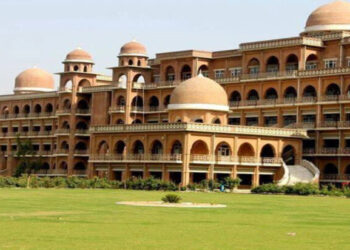ISLAMABAD: Supreme Court (SC) on Monday adjourned hearing on the “Supreme Court Practice and Procedure Bill” for three weeks, instructing the Attorney General to provide records of parliamentary debate on a law that aims to limit the powers of the Chief Justice, by tomorrow. The court has also maintained a hold on implementing the law until a final decision is made on the legal challenges brought against it.
The eight-member larger bench heard petitions challenging a recently passed law that aims to restrict the authority of the Chief Justice of Pakistan. The bench includes the Chief Justice Umar Ata Bandial, Justice Ijazul Ahsan, Justice Munib Akhtar, Justice Mazahar Ali Akbar Naqvi, Justice Muhammad Ali Mazhar, Justice Ayesha Malik, Justice Syed Hasan Azhar Rizvi and Justice Shahid Waheed.
At the start of the proceedings today, Attorney General informed the bench that plea for the formation of a full court to hear a case has been filed by both the government and PML-N, to which the bench replied that the government’s plea has not been scheduled for a hearing yet.
During a previous hearing, the court had requested certain documents, to which the AGP informed the court that he expects to receive the record of parliamentary proceedings by tomorrow and has contacted the NA speaker for the same.
The AGP stated that the judiciary’s independence is a vital aspect of the Constitution, and the law in question sets out the procedure for constituting benches and handling appeals, adding that the law’s decisions are administrative, and the Supreme Court’s rules were created by a full court.
He emphasized that cases concerning the judiciary’s independence and rules should involve a full court, and the law would apply to all judges, not just those hearing the case, to which Justice Ijazul Ahsan disagreed and stated that the issue concerned the power to legislate and not changes to the SC rules. “Various benches have been routinely hearing cases relating to legislative powers,” he said.
Justice Naqvi inquired whether a law requiring the president’s permission for making rules had been passed before. The AGP replied affirmatively, stating that this was the case until 1973. Justice Naqvi then questioned how such a law could be passed when Article 191 of the Constitution already existed. The AGP argued that no similar case had been filed previously and recommended the formation of a full court to consider the matter.
On this occasion, Justice Ayesha Malik commented that the Supreme Court can hear any case, even if it’s the first of its kind. She also questioned if the government wanted to take advantage of a full court and if they wanted internal discussions to be made public. She further asked how it could be determined if a case should be heard by a full court and if every case related to judicial independence was heard by a full court. She also questioned whether the petitioner’s whims should dictate court proceedings and whether the AGP was suggesting that the nation had demanded a full court.
She went on to state that the AGP’s argument was “beyond comprehension” as it indicated that a decision made by a full court was good and one made by a three-member bench was bad.
Justice Ahsan questioned whether the Attorney General was suggesting that the full court should interpret the rules since it had constituted them, to which the Attorney General responded that the Supreme Court had prohibited the government from implementing the law.
Justice Akhtar questioned why the Attorney General was not satisfied with a five-member bench as proposed by Parliament. Justice Ahsan further inquired about the possibility of the entire high court hearing a case if the top court issued an order.
The AGP noted a past case where an objection was raised by Zaulfiqar Ali Bhutto to judges on the bench, but the objection was dismissed, and a nine-member full court heard the case. The Chief Justice of Pakistan (CJP) commented that if there is an objection, the judge must decide if they want to hear the case or not, and further assistance may be needed to ascertain when a bench can call for a full court.
to this, the AGP argued that the case did not only concern the interpretation of the Constitution and referenced the establishment of military courts in the country, but the CJP noted that the current case did not concern a constitutional amendment.
The AGP wrapped up his arguments for the formation of a full court, suggesting that the court’s decisions were meant for the future. The CJP asked if the PML-N’s plea for the formation of a full court had been fixed for hearing, and the party’s lawyer confirmed that it had been submitted and fixed.



































